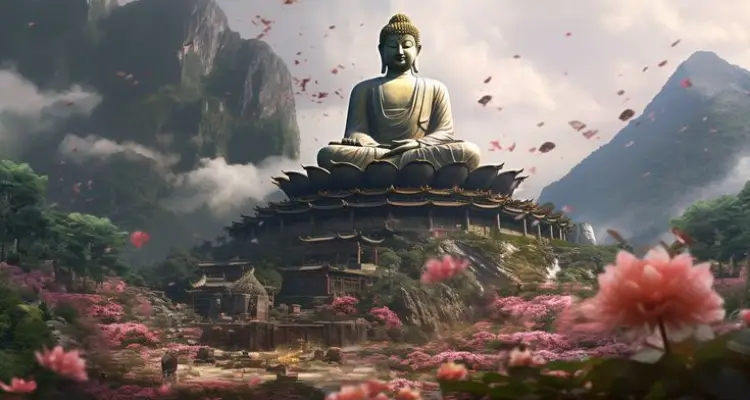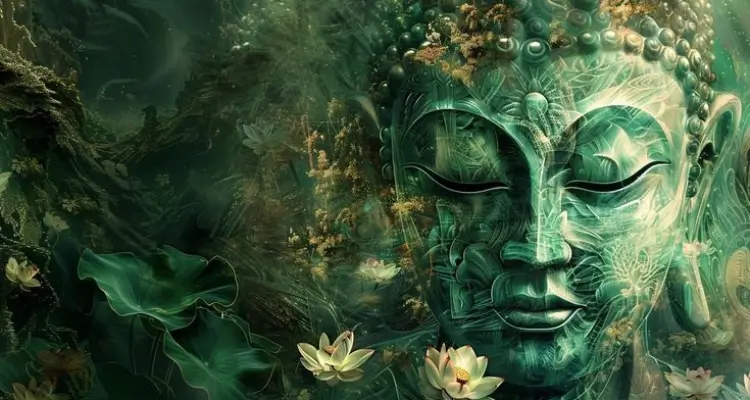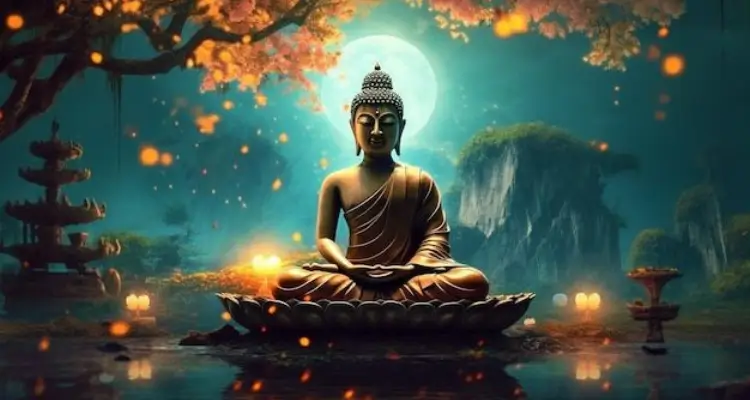Once upon a time, there was a young man named Akio, who lived in a small village in Japan. He was known for his constant restlessness. No matter what he achieved – a new tool, a compliment, or even a good harvest – Akio quickly felt that it wasn’t enough. He always believed that once he reached something more, his happiness would finally be complete. But after achieving one goal, a new desire would arise, leaving him with the feeling that he was never truly satisfied.
One day, while walking through the forest, Akio encountered an old Zen monk meditating by the river. Curious, he approached the monk and asked, “Master, why am I never satisfied? Whenever I achieve something, I immediately want more. What’s wrong with me?” The monk, with a calm gaze, replied, “Imagine that you are holding a jar with a small hole at the bottom. No matter how much you fill it, it will always be leaking, drop by drop.”
The monk’s response perfectly illustrates the concept of dukkha, which in Buddhism is often translated as “suffering,” but also means dissatisfaction or discomfort. Like Akio’s jar, we constantly try to fill our hearts with desires but never seem to achieve complete satisfaction. This is a common pattern in many people’s lives, and the relentless search for more becomes a difficult cycle to break.
Today, we will explore why, despite achieving what we want, the feeling of dissatisfaction persists. What is dukkha and how does it affect us? Why are we constantly searching for something to make us happy, yet still feel that something is always missing? Let’s dive deeper into these questions throughout this article.
What is Dukkha?
In Buddhist context, the term dukkha is often translated as “suffering,” but this definition is somewhat limited. While it does include physical and emotional suffering, dukkha extends beyond that. It describes the feeling of dissatisfaction that we experience in various situations in life, even when everything seems to be going well. This feeling that “something is always out of place” is a central aspect of the concept.
The meaning of dukkha thus encompasses a deep and lasting sense of discomfort, not only found in moments of pain but also in situations of pleasure. Even when we achieve something we desire, there is always the feeling that something is missing, or that the happiness we’ve attained is fleeting. This happens because dukkha refers to the impermanence of human experience. Things are not fixed; everything is in constant flux, which makes it hard to find lasting satisfaction.
This understanding is directly related to the Four Noble Truths, the fundamental principles of Buddhism. The first truth teaches that dukkha is an inevitable part of human life. The second states that suffering arises due to desire and attachment. The third truth suggests that it is possible to end this suffering, and the fourth shows us the way: the Noble Eightfold Path. Essentially, these truths help us understand how suffering and dissatisfaction are part of our experience and how we can transcend them.
Dukkha is not limited to difficult moments, such as losses or frustrations, but also appears during happy times. Even in joy, there is a subtle feeling that things are not entirely perfect, as everything is transient. It’s like an underlying sense of emptiness that persists, no matter the external circumstances. This is the power of dukkha – it permeates all areas of our life, from moments of pain to those of pleasure, showing that dissatisfaction is an intrinsic part of the human condition.
Why Are We Unsatisfied?
Endless Desire for Something More
The endless pursuit of more is one of the main reasons we feel dissatisfied. We live in a society that constantly bombards us with the idea that we need more: more money, more success, more things. However, when we finally achieve what we desire, happiness is fleeting. The momentary satisfaction quickly gives way to a new desire, and the cycle starts over again. This behavior reflects the insatiable nature of human desire, which never finds a final endpoint.
Example: Imagine buying a brand new phone that you’ve wanted for a long time. When you receive it, you feel great joy, but after a few weeks, the excitement fades. The phone becomes just another object, and you already begin to look at the next model, as if happiness is always ahead, never in the present.
Comparison with Others
Another factor that feeds our dissatisfaction is the constant comparison with others. In a highly connected world, social media has become a stage where people only share the best moments of their lives, creating an illusion of perfection. This leads us to believe that our lives are inferior or not as exciting as others. The feeling of inadequacy fuels the search for more, as if we need to meet the standards we see online.
Example: Seeing pictures of an exotic trip posted by a friend, you catch yourself thinking, “Why isn’t my life like that?” This kind of comparison can lead to feelings of frustration and dissatisfaction, even though your own life has many positive aspects. The feeling that something is always missing can be intensified by this distorted view of reality.
The Struggle Against Impermanence
Impermanence is one of the most universal laws of life: everything is constantly changing. However, many of us resist this truth, wanting the good things to last forever and the bad things to disappear quickly. This resistance to the transience of life creates suffering. When we try to hold onto moments or people that we know will change, we encounter emptiness when these things inevitably end.
Example: Think about an amazing trip you took and the emptiness you felt when it ended. You wanted that moment to last forever, but the reality is that everything passes. This feeling of loss is a clear expression of dukkha — the struggle against impermanence.
Resistance to Reality
Resistance to reality is one of the deepest sources of dissatisfaction. We often create expectations about how things should be, and when reality doesn’t match these expectations, we feel frustration. The desire for the present to be different from what it is prevents us from enjoying the moment, creating a continuous cycle of dissatisfaction. This resistance keeps us away from inner peace and traps us in the constant pursuit of something that will bring us contentment.
Example: You plan an event, and everything seems to be going well, but something small doesn’t go as you expected. Even if the event was a success, the frustration that things didn’t happen as planned can overshadow the enjoyment of the moment. This is resistance to reality — one of the greatest causes of dissatisfaction.
How the Buddhist Lifestyle Helps Deal with Dukkha
Mindfulness
The practice of mindfulness is essential for dealing with suffering and dissatisfaction. It involves being fully present in the moment, without judgment, and recognizing feelings and thoughts as they arise. When we practice mindfulness, we begin to notice dissatisfaction in its various forms, which gives us the opportunity to question its true nature and understand that it is temporary. Instead of getting lost in our desires and frustrations, we can learn to observe them more consciously.
How to Practice: To practice mindfulness, it’s essential to set aside a few minutes each day to stop, breathe deeply, and observe your thoughts and feelings. When you feel dissatisfaction or frustration arise, ask yourself: “What is causing this feeling? Is it permanent?” This moment of pause can help interrupt the cycle of endless pursuit and bring clarity about the impermanence of our desires.
Acceptance of Impermanence
Acceptance of impermanence is one of the most important lessons in Buddhism. Everything in life is constantly changing—both the difficult and the joyful moments. Resistance to this transience is one of the main causes of suffering. By accepting that nothing stays the same, we can find freedom and lightness. Acceptance doesn’t mean resignation, but rather understanding that change is part of life and that fighting against it only causes more pain.
How to Practice: A simple way to practice acceptance is by constantly reminding yourself that “this too shall pass,” whether during moments of happiness or difficulties. When facing a challenging moment, for example, think: “This moment, like all others, is temporary. I can endure it.” Similarly, when experiencing something positive, remember that it will also change, and fully enjoy the present without attachment.
Cultivating Gratitude
Instead of constantly searching for what we don’t have, Buddhism teaches us to cultivate gratitude. When we focus on the blessings of the moment, whether it’s health, relationships, or the small joys of everyday life, we can move away from the endless desire for more. Gratitude helps shift our perspective, making us more satisfied with what we already have and less focused on what we lack.
How to Practice: A simple gratitude practice is to reflect on three things you are grateful for at the end of each day. These things can be big or small, but by focusing on them, you begin to cultivate a mindset of abundance, which reduces dissatisfaction and increases the sense of contentment with the present.
Compassion for Yourself and Others
Compassion is another pillar of the Buddhist lifestyle that helps deal with dissatisfaction. Instead of judging ourselves harshly or comparing our lives to others, Buddhism teaches us to be kind to ourselves and others. When we practice compassion, we reduce self-criticism and comparison, allowing us to accept our flaws and those of others with more empathy.
How to Practice: To cultivate compassion, start by being kinder to yourself. When facing a mistake or failure, treat yourself with the same understanding you would offer to a friend. When interacting with others, remember that everyone faces challenges and difficulties. By developing this attitude of compassion, we can break down the barriers of judgment and comparison, creating a more peaceful inner environment, and consequently, being more free from dukkha.
Practical Examples of Change
Stressful Work
In a stressful work environment, it’s easy to get lost in the pressure of daily tasks and expectations. However, applying mindfulness can be a powerful tool to reduce stress and find moments of satisfaction, even in the most demanding situations. By practicing mindfulness, you learn to be present in each task without being swept away by anxiety or mental overload. This doesn’t mean work will become easy, but you can learn to handle it in a more balanced and calm way.
How to Practice: When stress begins to rise, stop for a moment, take a deep breath, and focus on what’s happening right now. Notice the small details around you, such as the sound of the keyboard or the sensation of your feet on the ground. By focusing on the present, you reduce the tendency to get lost in anxious thoughts about deadlines or future outcomes. This simple act of mindfulness can help you find moments of satisfaction and clarity, even in a challenging job.
Difficult Relationships
Relationships, whether personal or professional, often involve challenges. Human imperfections can create frustration and conflicts. Buddhism teaches us to practice acceptance of others’ imperfections, which can help reduce conflicts and promote more harmonious interactions. By developing empathy and compassion, we can see beyond others’ flaws and handle difficulties in a more understanding way, without feeding resentment or frustration.
How to Practice: When confronted with a conflict or difficult situation in a relationship, stop and breathe. Instead of reacting impulsively, try to understand the other person’s point of view. Ask yourself: “What might this person be feeling?” This helps to ease tension and create space for compassion. By treating others with empathy, you can turn moments of friction into opportunities for growth and mutual understanding.
Anxiety About the Future
Anxiety about the future is one of the main sources of suffering in our daily lives. The mind tends to anticipate what has not yet happened, creating a cycle of worry that prevents us from fully living in the present. The practice of mindfulness is an effective way to focus on the here and now, reducing anxiety about what may or may not happen in the future. By learning to live in the present, we can lessen excessive worry and the feeling of a lack of control over the future.
How to Practice: When you feel anxiety about the future arising, stop and breathe. Bring your attention to the present moment and observe what’s happening around you. Ask yourself: “What is within my control right now?” By focusing on actions you can take now, you begin to lighten the burden of what’s to come and live with more calmness and clarity. The constant practice of mindfulness creates a sense of inner security, regardless of the uncertainties of the future.
Conclusion
Throughout this text, we have explored how the concept of dukkha — dissatisfaction and suffering present in all aspects of daily life — manifests in our everyday experiences. We have seen that the relentless pursuit of more, constant comparison with others, and resistance to impermanence are factors that fuel this cycle of dissatisfaction. However, the Buddhist lifestyle offers us effective tools to deal with this reality. The practice of mindfulness, acceptance of impermanence, gratitude, and compassion are key essentials to transform our relationship with dissatisfaction, allowing us to live with more balance and harmony.
The final reflection invites us to think about the importance of adopting these practices in our daily lives. By integrating mindfulness, acceptance of change, and gratitude, we can find more peace in the present moment and reduce anxiety and the constant desire for more. These practices not only help us cope with inevitable suffering, but also cultivate a fuller and more conscious life. When we free ourselves from the relentless search for more, we can truly appreciate the riches of the present moment and connect with what we already have.
Now, we want to hear from you: How do you deal with dissatisfaction in your life? What has changed for you after learning about the concept of dukkha and its possible ways of overcoming it? Leave a comment below and share your experiences and reflections with us. After all, exchanging experiences is one of the most powerful ways of growth and transformation.

































